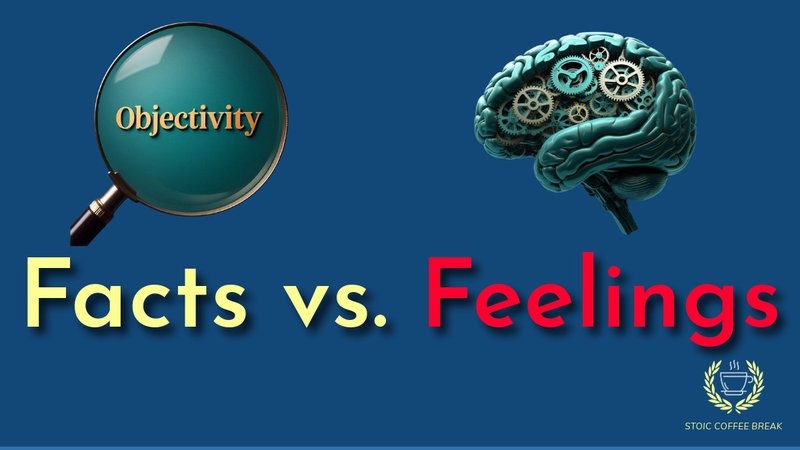
The Stoics place a premium on rationality and objectivity to help manage our emotions. But how do we develop that objectivity? Why should we practice become more objective? In this week’s episode we’re going to dive into those questions and talk about how you can be more objective.
“Between stimulus and response, there is a space. In that space is our power to choose our response. In our response lies our growth and our freedom.” — Viktor Frankl
The Storm on the Mountain
Imagine you’re standing on a mountain peak. The sky is clear, the air crisp. You take in the vast expanse of the world below, feeling a sense of peace and perspective. But suddenly, clouds roll in. The wind picks up. A storm is forming.
Most people, when faced with an approaching storm, panic. They run, they flail, they curse their luck. But a seasoned mountaineer knows that the storm is not personal. The storm is just a storm. It has no malice, no agenda—it simply is. A skilled climber doesn’t waste time on frustration but instead focuses on what is within their control—finding shelter, securing their footing, and waiting for the storm to pass.
This is exactly how emotions work. Life will throw storms at you—frustration, disappointment, anxiety, anger. But these emotions are not personal attacks. They are just events, passing through your mind like weather through the sky. The question is: do you let them sweep you away, or do you learn to observe them with detachment, as a Stoic would?
This episode is all about objectivity—learning how to step back, separate yourself from the storm, and respond with clarity instead of reaction.
The Problem: How We Get Swept Away by Our Emotions
So why is objectivity such an important skill to learn?
Objectivity gives us the ability to separate facts from feelings so that we handle situations in way that is not only productive, but helps bring peace of mind. Objectivity is not about about eliminating emotions, but rather to take a step back, notice, and feel our emotions without allowing them to overrun us.
Most of us go through life as if we are at the mercy of our emotions. We feel anger and assume we must act on it. We feel anxious and assume we must be in danger. We feel hurt and assume we must retaliate.
But what if I told you that feelings and emotions, on their own, have no real power? It’s your interpretation of them that gives them their grip.
Now the first thing I want to clarify is that the Stoics differentiate between our initial impression of something and the emotions that come from our perspective or interpretation of a situation. This is why the Stoics taught that negative emotions comes from our misjudgments or errors in our thinking. We tell our ourselves stories to try and explain the feelings or impressions we have about something, which creates our emotions.
By being aware of those first impressions, those feelings, we can learn to pause, think about our conscious and unconscious judgments of those impressions, and then decide whether or not it is correct. As Epictetus reminds us:
“Don't let the force of the impression when first it hits you knock you off your feet; just say to it, "Hold on a moment; let me see who you are and what you represent. Let me put you to the test."
Example: The Missed Text Message
Imagine you text a friend something important, and hours pass with no response. Your mind immediately jumps to conclusions:
- Did I say something wrong?
- Are they mad at me?
- Are they ignoring me?
- Do they even care about me?
It’s like your mind becomes a drama queen, thinking of all the worst case scenarios of why your friend didn’t get back to you. Now, stop. Step back. Apply objectivity.
Is there actual evidence that your friend is upset? Or is your brain acting like a drama queen and filling in the gaps with assumptions and fears? Maybe they’re busy. Maybe their phone died. Maybe they saw the message and planned to respond later.
Marcus Aurelius, in Meditations, teaches us:
“You have power over your mind—not outside events. Realize this, and you will find strength.”
Your emotions are not reality. They are just signals, often distorted by bias, fear, or past experiences.
The Stoic Approach: The View from Above
One of the greatest Stoic tools for objectivity is The View from Above. This means zooming out and looking at your situation as if you were an outsider.
Imagine watching your life as if you were a historian recording events, rather than someone caught in the middle of them. Would a historian describe your missed text message as a tragic personal betrayal? Or would they simply state:
“At 2:17 PM, John sent a message. At 7:45 PM, he still had not received a reply.”
That’s it. No drama, no assumptions. Just facts.
Example: The Public Embarrassment
Let’s say you’re giving a presentation at work, and midway through, you completely blank out and forget what to say next. Your mind spirals:
- I just made a fool of myself!
- Everyone thinks I’m incompetent!
- My career is over!
Now, step back. View it objectively. What actually happened? You forgot a point. Maybe there was an awkward pause. Maybe someone noticed. Then what? The world moved on.
Seneca reminds us:
“We suffer more in imagination than in reality.”
When you remove the emotional weight, most “crises” in your life shrink to mere moments.
Example: Difficult Conversations
Another area that I find objectivity to be very useful is in having difficult conversations. Often, when we have to have a difficult or challenging conversation, our emotions get in the way. We get upset that the other person doesn’t see things our way or act the way we want. We often take it as a personal attack.
Marcus Aurelius gives us the perfect mindset for this:
“If anyone can refute me—show me I’m making a mistake or looking at things from the wrong perspective—I’ll gladly change. It’s the truth I’m after, and the truth never harmed anyone.”
The moment you see a conversation as a search for truth rather than a battle to win, you approach it with curiosity instead of defensiveness. When we practice objectivity, then we give some space for ourself and for the other person to work through the issues at hand. We’re able to focus on the facts and get to the root of the problem, rather than simply blaming them for how we feel.
Being objective doesn’t mean being cold or emotionless—it means being clear-headed. And clarity allows for compassion. When you remove your own biases and emotions, you’re able to see the other person as a human being rather than an opponent.
Try This:
- Assume good intent unless proven otherwise.
- Instead of thinking, “They’re being ridiculous”, try, “They must have a reason for feeling this way. What is it?”
- Recognize that just as your emotions are influencing your perspective, their emotions are influencing theirs.
The bottom line is difficult conversations don’t have to be battles. When you bring objectivity into the mix, you turn arguments into discussions and conflicts into opportunities for growth. By stepping back, delaying reactions, removing ego, and practicing compassionate objectivity, you turn emotional landmines into stepping stones toward better understanding.
And let’s be real—life’s too short to waste energy on unnecessary drama.
How to Cultivate Objectivity in Daily Life
Knowing this is one thing—practicing it is another. So how can you train yourself to be more objective in your thinking?
A) Ask: “What Would a Friend Say?”
If your best friend came to you in distress over a similar situation, how would you respond? You’d likely be kind, logical, and offer perspective.
• “Your friend didn’t text back? They’re probably just busy.”
• “You messed up a presentation? So what? Everyone does at some point.”
Now, turn that same reasoning on yourself.
B) The “Will This Matter in a Year?” Test
When something upsets you, ask: Will I still care about this in a year?
• If yes, then it’s worth careful, objective thinking.
• If no, then why waste today’s peace over it?
Most of our daily frustrations—traffic, minor disagreements, awkward moments—are forgotten within weeks or days.
C) The “Marcus Test”
This is one of my favorites. Before reacting emotionally, imagine you have to explain your reaction to Marcus Aurelius.
• Would he be impressed that you lost your temper because the barista got your coffee order wrong?
• Would he admire the fact that you spent all day upset over a rude comment online?
Probably not. So why not save yourself the embarrassment and just skip the overreaction?
Epictetus put it simply:
“It is not events that disturb people, but their judgments concerning them.”
Why Objectivity Leads to More Peace
Let’s return to the storm on the mountain. The storm will come—there’s no avoiding it. But when you practice objectivity, you learn to observe instead of panic.
This doesn’t mean you suppress emotions. It means you understand them.
- Anger doesn’t force you to yell.
- Anxiety doesn’t force you to worry.
- Fear doesn’t force you to hide.
By mastering objectivity, you regain control. You become the eye of the storm—calm, steady, and unmoved.
Seneca offers the perfect final thought:
“A man who suffers before it is necessary suffers more than is necessary.”
So next time you feel emotions taking over, step back. Look at the situation with clarity. Separate facts from fears. And choose your response—not out of impulse, but out of wisdom.
Closing Questions:
- Can you think of a time where an emotional reaction made a situation worse?
- What would have changed if you had paused and taken an objective perspective instead?
- How can you practice The View from Above today?
Objectivity is about empowerment. It’s about reclaiming your mind, training yourself to see with clarity, and becoming the calm, unshakable presence that Stoicism teaches us to be.
So when the storm comes, don’t fight it. Observe it. Choose your response wisely. And in doing so, become stronger.
My book Stoicism 101 is available! Order here!Find out more at https://stoic.coffeeWatch episodes on YouTube! Find me on linkedIn, instagram, twitter, or threads. Thanks again for listening!


